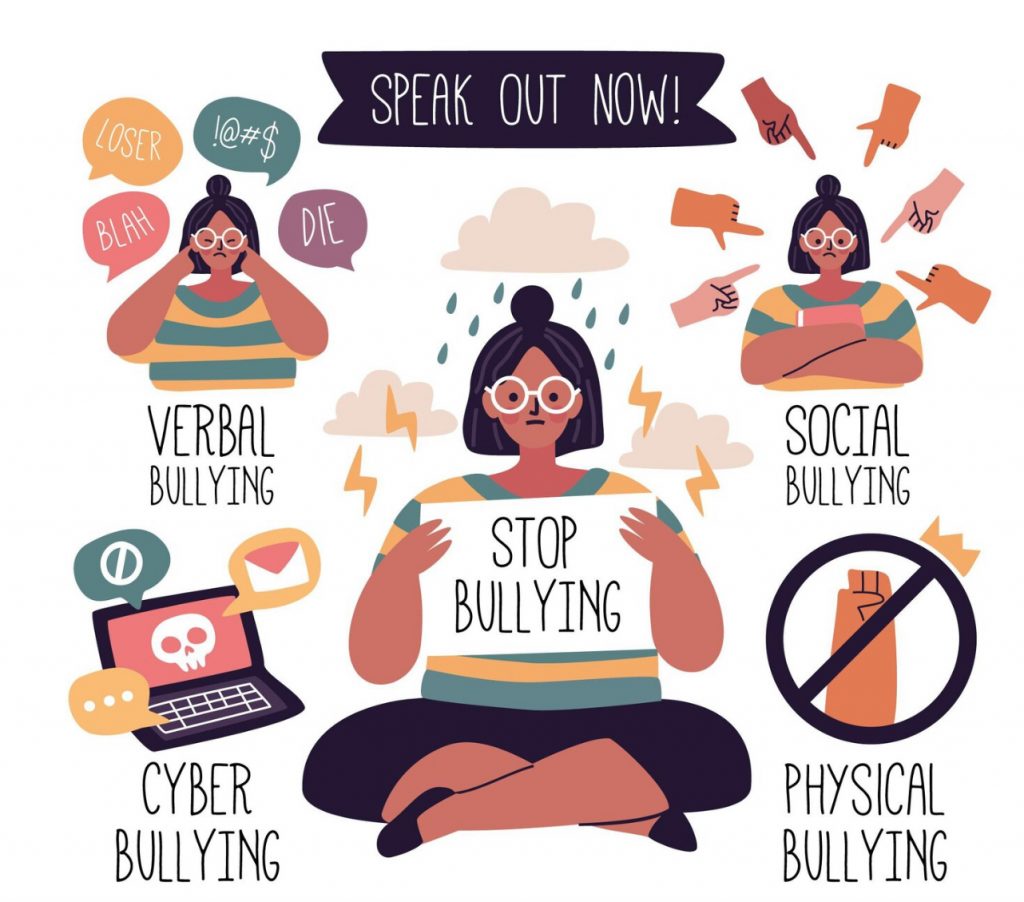
Image by pikisuperstar on Freepik
In recent years, there has been increasing discussion about the detrimental impact of bullying on individuals’ mental health, persisting even years after the incidents occur. Bullying encompasses unwanted aggressive behaviors such as cyberbullying, physical bullying, emotional bullying, verbal harassment, and discrimination based on factors like disability, religion, gender identity, and sexual orientation. Its effects on teens can be both short-term and long-term, affecting mental and physical health. Short-term effects include decreased self-esteem, sleep disturbances, and behavioral changes, while long-term effects may manifest as health complications, engagement in risky behaviors, further decline in self-esteem, and difficulty forming interpersonal connections. While it’s challenging to completely eradicate bullying, proactive measures can be taken to mitigate its occurrence and reduce its severity.
There are numerous short-term impacts bullying can have on teenagers, such as sleep deprivation. Victims of bullying often experience disturbances in sleep due to reasons like nightmares or flashbacks as they recount traumatic bullying incidents, leading to stress, anxiety, and fear of recurrence. This disruption in sleep is detrimental, especially for teens who are still undergoing physical and emotional development. Sleep deprivation is linked to lower cognitive function and can exacerbate existing mental health conditions. A study conducted in 2014 involving 5 420 teens found that bullied adolescents were twice as likely to develop sleep issues compared to non-bullied peers (Hunter et al., 2014). Another short-term impact of bullying is decreased self-esteem. Research has indicated that significantly bullied teens exhibited lower self-esteem and confidence than their non-bullied counterparts (Smith, Johnson, & Williams, 2019). This finding was corroborated by a 2020 study, which reported a correlation between bullying victimization and diminished self-esteem. Behavioral changes are also common short-term consequences of bullying. Victims may experience emotional distress, including sadness, fear, shame, and anger, leading to withdrawal from social situations or aggressive behavior as a means of self-protection. Additionally, victims may engage in risky behaviors as a coping mechanism to regain a sense of control over their lives. These risky behaviors serve as a way for victims to cope with the pain and sense of restriction caused by bullying. Furthermore, changes in interactions may occur as victims become more hostile, suspicious, and mistrustful of their peers, making it difficult for them to form relationships. It’s crucial to recognize the short-term implications of bullying on teenagers and take proactive measures to address and prevent it (Luis, 2021).
Bullying’s long-term implications can have severe repercussions on individuals’ mental health, persisting well into adulthood. Effects such as decreased self-esteem can endure for many years, with research indicating that bullying has a more profound impact in adulthood than previously understood. Adults who were bullied as children face an increased risk of internalizing mental health issues like anxiety and depression, as well as experiencing psychotic experiences during young adulthood. Furthermore, there’s a heightened likelihood of suicidal ideation, suicide attempts, and even acts of suicide years after the initial bullying incidents occurred. Moreover, adults who endured bullying in childhood often report ongoing health problems, including prolonged recovery times from viral infections and more chronic body aches and headaches. Many continue to perceive violence as a potential threat, leading some to resort to violent actions as a means of self-protection. Additionally, victims of childhood bullying are more prone to being aggressive towards their partners and children, perpetuating the cycle of violence (NCIB, 2016). These long-term implications underscore the urgent need for comprehensive efforts to prevent and address bullying at all ages.
Indeed, bullying can result in severe short-term and long-term consequences, the severity of which depends on various factors such as the duration and intensity of the bullying. It’s crucial to address bullying comprehensively, not only by supporting victims but also by providing help for the bullies themselves, as they may be struggling with their own mental health issues. Educating children about the effects of bullying in an age-appropriate manner is essential to prevent its occurrence. If bullying has already taken place, it’s important for individuals to take time to process their emotions, seek support from mental health professionals, and receive guidance to cope effectively. Understanding the effects of bullying is pivotal in fostering a world with less bullying and discrimination. By prioritizing education, support, and proactive intervention, we can work towards creating safer and more inclusive environments for everyone.
References
Smith, J. K., Johnson, A. B., & Williams, C. D. (2019). The impact of bullying on adolescent self-esteem: A longitudinal study. Journal of Adolescent Psychology, 25(3), 123-135.
Jones, R. L., Garcia, M. A., & Thompson, E. H. (2020). Bullying victimization and self-esteem: A meta-analysis of longitudinal studies. Psychological Bulletin, 145(4), 367-389.
Rivara, F. (2016, September 14). Consequences of bullying behavior. Preventing Bullying Through Science, Policy, and Practice. https://www.ncbi.nlm.nih.gov/books/NBK390414/#:~:text=Being%20bullied%20makes%20young%20people,isolated%2C%20angry%2C%20and%20withdrawn.
Warner, M. (2021, March 12). The Impact of Bullying on Mental Health. Louis a. Faillace, MD, Department of Psychiatry and Behavioral Sciences. med.uth.edu/psychiatry/2021/03/12/the-impact-of-bullying-on-mental-health
Note: The Free Your Mind Mental Health Society is an independent youth-led organization. The contents of this blog are not intended to be a substitute for professional medical advice, diagnosis, or treatment. Always seek the advice of your physician or another qualified health provider with any questions you may have regarding a medical condition. In the event of a medical emergency, please call your doctor or 911 or other local emergency numbers immediately.



